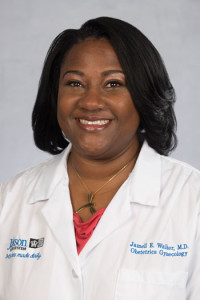As part of Breast Cancer Awareness month, I’d like to bring a few important facts to improve your understanding of breast health. Knowledge is power, and the importance of being an empowered woman who proactively manages her health should not be underestimated. Knowing your own family history, your body and how your lifestyle may impact your risks are all important to your overall health.
The American College of Obstetrics and Gynecology recommends annual clinic breast examination, annual breast exam after age 40, and earlier examination in women with a family history of breast cancer.
According to the National Cancer Institute in 2011, 27% of all new cancers diagnosed in women are breast cancers. This accounts for a lifetime risk of 12.08% or 1:8 risk of developing breast cancer. With recent advancements in treatment modalities and early detection, there has been a steady decline in breast cancer-related mortality since 1990 (American Cancer Society).
If a woman has a family history of breast cancer (first degree relative), test positive for the BRCA1 or BRCA2 mutations, or has an estimated lifetime risk of breast cancer of 20% or greater, then enhanced screening is recommended and these women are encouraged to seek physician care for risk-reduction strategies.

Jamell E. Walker, M.D. Dr. Jamell Walker is a board certified OB/GYN practicing here in south Florida. Being able to work with women during the major milestones of their lives brings her great professional fulfillment. She enjoys all aspects of obstetrics/gynecology and is trained in minimally invasive procedures including robotics and laparoscopic surgery. To speak with Dr. Walker or schedule an appointment, call 305.256.2150.
The American College of Obstetrics & Gynecology recommends mammogram annually in women 40 years or older, clinical breast exam in women 20 – 39 years every 1 – 3 years and in women 40 years or older annually, self-breast exam in high risk patients, and self breast awareness in all women. Women over the age of 75 no longer need mammogram screening as the benefit of screening decreases compared with the risk of over-treatment. Due to this, the U.S. Preventative Task Force recommends that women over the age of 75 should consult with a physician and make a shared and individualized decision whether to continue mammography screening.
Overall, women and their physicians should make shared healthcare decisions.
Even though the new guideline does not recommend self-breast examination, I advocate that all women should begin self breast awareness and become familiar with their breast tissue. Knowledge is power, and this is true especially about knowing your body and your breast health. And, being an aware and vocal self advocate is important to the quality of the healthcare you receive. Remember, clinical breast exams are only recommended yearly or if something is different. “If you notice a lump that moves, doesn’t move, is painful, or not painful, you should call your doctor. If you notice that you skin has changed and looks dimpled like an orange peel, you should call your doctor, If you notice that you are having nipple discharge, unrelated to breastfeeding or stimulating them, you should call your doctor. If you notice that your nipple is pulled in rather than pointing out, or your skin is puckered and being pulled in, you should call your doctor.
Big picture, if you notice something different, call your doctor.”



